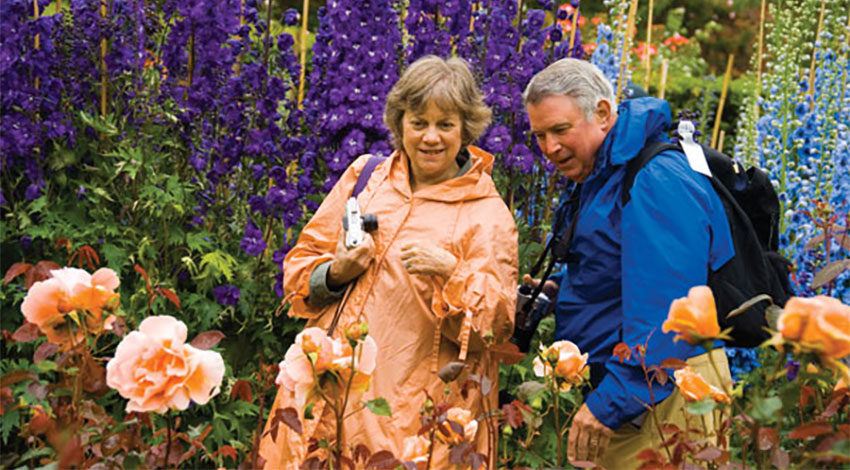Go Inside the Chelsea and Hampton Court Flower Shows With Judge Kevin Tooher
If you love flowers, then you may agree that Kevin Tooher has the greatest job in the world.
As a judge for England’s Royal Horticultural Society, he is on the front lines as lilies, dahlias, roses and the world’s most beautiful flowers are presented for two of England’s premier flower shows. We caught up with Kevin to get his perspective on the Chelsea and Hampton Court Flower Shows, just before he leads lucky groups of Road Scholars through these breathtaking worlds of flowers and design.

Road Scholar: Kevin, please tell us a little about yourself!
Kevin Tooher: I have worked as a college lecturer for 11 years teaching horticulture, which includes garden history, practical gardening and science. I am also the chairman of the local Whitstable Horticultural Society and a judge for the Kent Wildlife Trust.
This is a second career. I honed my gardening skills with 10 years of part-time study while serving as a detective in the London Metropolitan Police and then qualified as a teacher.
RS: How did you become a Royal Horticultural Society judge?
KT: The Royal Horticultural Society (RHS) was looking to expand their trials system and invited applications for the position, and I was selected. I have been on two trials, each one lasting a minimum of three years, firstly perennial Euphorbias and then Penstemons.
RS: What are the primary responsibilities of the Royal Horticultural Society?
KT: The RHS is a charitable organization and in 1809 set its aim to “the improvement of horticulture in all its branches.” It is pretty much how it is today.

RS: Any tips for enjoying the Chelsea or Hampton Court Flower Shows?
KT: Chelsea and Hampton Court are very different animals. For Chelsea, get there early and do the show gardens first before it gets too busy. The great marquee is good to shelter when it rains, but just enjoy the vibe and the bustle as the day builds. Hampton Court being more spacious is more relaxed, so take your time and make sure you follow the instructor and see all of the gardens. The principal difference for the locals is that there are masses of plants for sale throughout Hampton Court but none on-site at Chelsea. Only on the last hour of the last day do most of the exhibitors sell off their material to save taking it home — there is a mad scramble for some good bargains.
RS: What are the can’t-miss exhibits that Road Scholars should be on the lookout for at the shows?
KT: The show gardens; the large ones first, then the artisan gardens and then the modern gardens.

RS: What are the other elements that participants will particularly enjoy on these programs?
KT: The scale of the grand marquee is impressive with its backdrop to the Chelsea Hospital, home of the famous Chelsea Pensioners. The skill that goes into the exhibits and keeping them looking great through the week is impressive. Look out for medals — gold, silver-gilt, silver and bronze, and the best-in-show awards — and see if you agree. The people vote every year by a telephone vote, and it is not usually the same garden that wins.
RS: What are your favorite things to grow in your own garden?
KT: I am a member of the British Clematis Society, The RHS Lily Group and the Australasian Plant Society amongst others, so anything in these could be a favourite — although our lilies are plagued by Lily beetle!
RS: A novice gardener asks you for the one piece of advice that could help them get their flower garden off the ground. What would you say?
KT: “Right plant right place” means you are less likely to lose plants and become disheartened straight away. Look at what grows well in your neighbour’s garden where the soil conditions are the same. Plants that like Florida will not like Montana. It’s the same in England — the west is wet and mild, the east is cold and dry.
RS: English gardens are iconic in the horticultural world. Why is gardening so important in local culture? What are the conditions that seem to benefit English gardens so greatly?
KT: In the UK as a whole, we benefit from a maritime climate. Having the sea all around us keeps us milder and with fewer extremes than in mainland Europe. Regular rainfall usually means we can grow a wide range of plants. The west coast — with the influence of the Gulf Stream — is frost-free most years, so lots of tender plants can be grown outside all year round.
RS: Outside of England, where are your favorite gardens in the world?
KT: I love the Italian gardens of Florence — the Medici gardens and also Lake Como Villas — but there are so many more all over the world yet to visit!
________________________________________________________________
